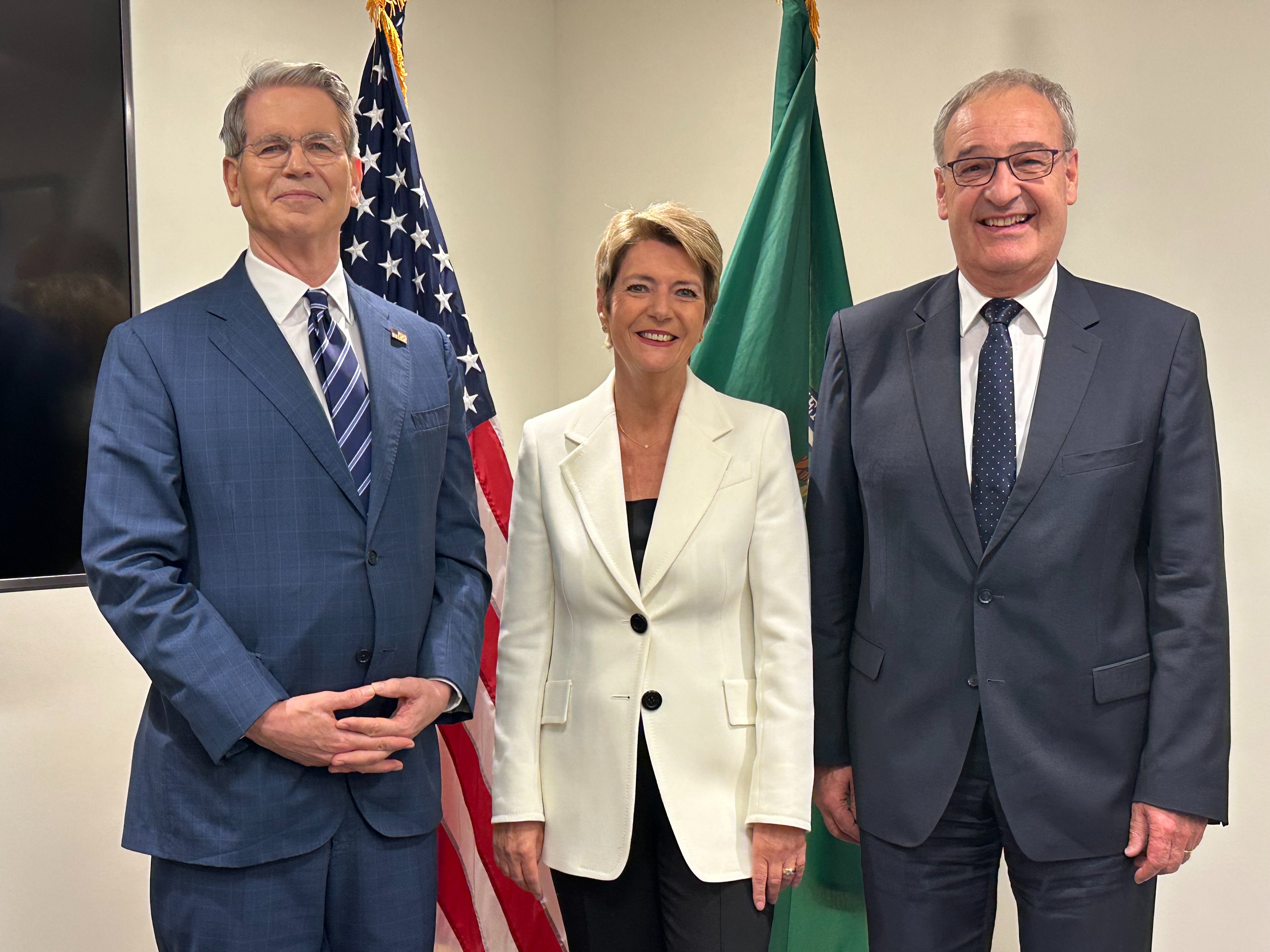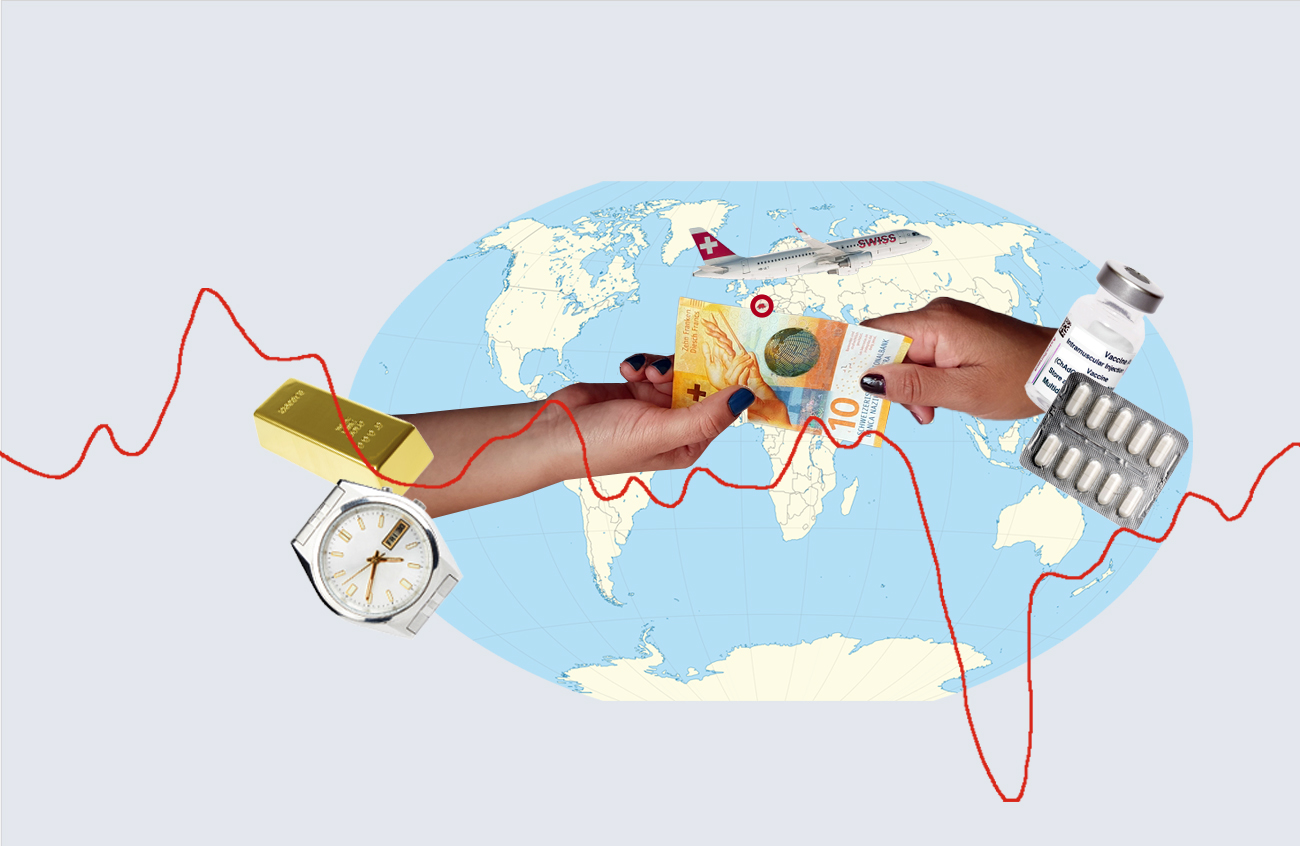New York, Beijing, Tokyo – the Swiss government is on a mission to save trade

Swiss politics is on pause with the government's focus firmly on the economy. Three top ministers are abroad this week visiting China, Japan and the US. This is because export-reliant Switzerland is in danger of being caught in the trade war between two giants.
It looks like a coincidence, but it’s anything but the usual overseas diplomacy. Foreign Minister Ignazio Cassis is visiting Japan and China, while Economics Minister Guy Parmelin is in the US with Finance Minister Karin Keller-Sutter.
Switzerland is repositioning itself in a world in which old partnerships are being put to the test – nothing is more important to the Swiss government at the moment.
American tariffs
The US is Switzerland’s second largest trading partner after the European Union. Economics Minister Guy Parmelin and President Karin Keller-Sutter were in New York until Friday. Both members of the governing Federal Council took part in a meeting of the International Monetary Fund. That was the official missionExternal link. Keller-Sutter’s trip had been planned for a long time.
It was also intended that the Swiss president would use her visit to establish contacts with key figures in the Trump administration. This unofficial endeavour has now been given top priority. The Swiss government is trying at all levels to fend off the announced, but for the time being postponed, US tariff hike of 31%.
This is also reflected in the fact that three state secretaries and the newly appointed special envoy for the US, Gabriel Lüchinger, also travelled to the US. The NZZ newspaper writes of an ‘all-star teamExternal link’.
In addition, the Economics Minister Parmelin’s visit to the US was not even planned. He was originally supposed to fly to Japan to the World Expo in Osaka. This Japan assignment went to Foreign Minister Ignazio Cassis at short notice.
Reinforcing ties with China
China is Switzerland’s third most important trading partner, Japan the fourth. The Swiss Foreign Minister’s visit to China came as a surprise and was planned for later in the year. According to official Swiss sources,External link the visit to China could be ideally combined with the foreign minister’s trip to Japan.
But here, too, the real background is likely to be the US tariffs. After Trump’s tariff blitzkrieg, the Swiss government quickly became convinced that Switzerland, which is heavily export-oriented, needed to rethink its foreign trade network and broaden its base.
China, which has a free trade agreement in place with Switzerland since 2014, offers itself as an obvious alternative with growth potential – along with India, with a free trade agreement concluded in 2024, and Mercosur, where such an agreement is planned.
In any case, Switzerland’s existing free trade agreement with China is currently being updated at Switzerland’s request. It is to be expanded in favour of the pharmaceutical and machine tools industries.
The trip to China has also become urgent because Switzerland does not want to lose its pole position in Beijing. After all, if the US implements its tariff announcements, China will soon be courted by many countries – especially Germany, which is also eyeing the Chinese market with its precision industry. But Switzerland still has an important head start. In order to secure this, it is now utilising its good contacts to cultivate relationships at an early stage.
Foreign Minister Cassis met with Chinese Foreign Minister Wang Yi in Beijing. Officially, Switzerland is talking about ‘consolidating bilateral relations’ and ‘deepening political dialogue’. The 75th anniversary of diplomatic relations between the two countries will also be celebrated.
Very good discussion with my colleague, Foreign Minister Wang Yi.
— Ignazio Cassis (@ignaziocassis) April 24, 2025External link
We exchanged on our bilateral relations, including the update of our free trade agreement and the celebration of 75 years of diplomatic relations, global economic challenges, and security issues in #UkraineExternal link, the… pic.twitter.com/Qfn2BnIyBsExternal link
“Historical milestones are very important in China,” explains Kurt Haerri, long-standing president of the Swiss-Chinese Chamber of Commerce. Good relations with counterparts are also much more important in China than in other countries, says the China expert.
Tough task in the US
The challenge in the US was for Switzerland to be able to present its concerns to the right people, preferably Donald Trump himself.
The fact that Karin Keller-Sutter was one of the few heads of state to have a 25-minute phone call with Trump on April 9 shows that Switzerland has already lobbied well. Nevertheless, with a new ambassador and a new administration, Switzerland is basically restarting its current relations with the US.
However, thanks to the efforts of the Swiss trade delegations to date and the significant investment commitments made by Roche (CHF 50 billion) and Novartis (CHF 23 billion), which the Swiss companies communicated in parallel with the Federal Council’s trade mission, there are opportunities.
Trump’s increased interest in a new nuclear agreement with Iran is also likely to be helpful. Switzerland has played the role of Washington’s messenger to Tehran for the US since 1980. Back in 2019, this protecting power mandate earned the then Swiss President Ueli Maurer an unexpected invitation from Trump to the White House.
But there is also danger: Trump’s dislike of China could lead him to demand allegiance from his trading partners. He may require Switzerland to choose between China and the US.
Challenge in China
The trip to China is primarily about cultivating relationships. But as always with China and Switzerland, it is also about the delicate balancing of Switzerland’s economic interests and its political values.
After all, China expects its trading partners to make concessions. “The good relationship is not set in stone. The atmosphere can easily be disturbed,” says China expert Kurt Haerri.
In Switzerland, the Greens and the Social Democrats in particular are pushing for points such as forced labour and sustainability to be included when the free trade agreement is updated.
More
Why Switzerland seeks deeper ties with China

For Ignazio Cassis, the aim in Beijing is therefore to emphasise Switzerland’s interest in the Chinese market – and at the same time to drive home the message that China’s actions can be criticised even with a free trade agreement.
“We are ambitious, because we have to convince parliament and most likely also the Swiss people to approve the expanded agreement,” said Cassis in a speech in BeijingExternal link.
What can Switzerland achieve in the US?
Finance Minister Keller-Sutter met with her American counterpart, Treasury Secretary Scott Bessent. He is regarded as a key figure in the tariff issue and was already in the room when Donald Trump spoke to Keller-Sutter on the phone. The Swiss Finance Minister had another opportunity to put forward her arguments: Switzerland is the sixth largest investor in the US.
Productive exchange with US Treasury Secretary @SecScottBessentExternal link in Washington: We discussed key economic issues and opportunities for enhanced collaboration between our two countries. @ParmelinGExternal link pic.twitter.com/exV4oxpJrwExternal link
— Karin Keller-Sutter (@keller_sutter) April 24, 2025External link
The Swiss pharmaceutical giants Roche and Novartis also invest another $75 billion dollars in the US. In addition, the trade deficit used by the US to calculate the tariffs is a distorted picture. On the one hand, gold exports from Switzerland drove up the trade surplus in 2024. Secondly, the US services imported by Switzerland – such as software licences – were not taken into account.
Rencontre constructive avec l’ambassadeur Jamieson Greer @USTradeRepExternal link pour discuter des relations commerciales bilatérales. Nous nous réjouissons de futurs échanges et de la poursuite de collaborations. pic.twitter.com/QWYdAuflcIExternal link
— Guy Parmelin (@ParmelinG) April 23, 2025External link
Switzerland’s aim for the bilateral meeting was to define the topics for further tariff negotiations. Parmelin met with US Secretary of Commerce Jamieson Greer and with US Secretary of Education Linda McMahon.
What can Switzerland achieve in China?
If the trade war between China and the US intensifies, new suppliers and producers will be needed in China – for the automotive and machinery industries, for example. This is because US suppliers will have to withdraw from the Chinese market, as the high tariffs will make their products too expensive.
This creates gaps that Swiss suppliers could fill. Thanks to the existing free trade agreement, Swiss suppliers would be one step ahead of many others.
A second round of negotiations to update the free trade agreement with Switzerland is due to take place in the second half of this year. Switzerland’s interest in this has increased.
Edited by Samuel Jaberg and Marc Leutenegger. Adapted from German by DeepL/ac

In compliance with the JTI standards
More: SWI swissinfo.ch certified by the Journalism Trust Initiative













You can find an overview of ongoing debates with our journalists here . Please join us!
If you want to start a conversation about a topic raised in this article or want to report factual errors, email us at english@swissinfo.ch.